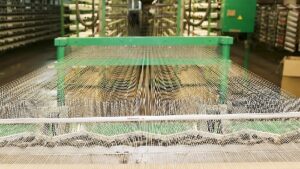This past December, Sabic released two new polybutylene terephthalate (PBT) compounds: LNP Elcrin WF006XXPiQ and LNP Elcrin WF0061XPiQ. These are the first two grades in a new portfolio of materials that incorporate pre-consumer recycled glass fiber diverted from the waste stream of industrial processes. Reinforced with 30% pre-consumer recycled short glass fiber, the PBT compounds offer the mechanical properties and color equivalency of Elcrin iQ grades that use virgin glass-fiber reinforcement; additionally decreasing the carbon footprint of Elcrin iQ materials and reducing plastic waste by using upcycled polyethylene terephthalate (PET) from discarded water bottles.
Luc Govaerts, Director, Formulation and Application Development for Sabic’s Specialties Business stated: “We are continually pursuing new avenues to accelerate carbon neutrality for our materials across our portfolio. This effort includes evaluating each component of our thermoplastic compounds and collaborating with others in the value chain to identify potential replacements that can drive circularity. Central to this process is the prioritization of customer needs, so that greater sustainability goes hand-in-hand with outstanding performance, consistent quality, and processing efficiency.”

“The short glass fiber used in these new Elcrin iQ materials contains 100% recycled content, according to Underwriters Laboratories’ Recycled Content Validation procedure (UL 2809), following the mass balance approach. Compared to virgin PBT reinforced with virgin glass fiber, the LNP Elcrin WF006XXPiQ compound contains 67% recycled content and lowers the carbon footprint by 29%, while the LNP Elcrin WF0061XPiQ compound contains 55% recycled content and reduces the carbon footprint by 24%.” (Plastics Today)
Because of their properties – stiffness and strength, chemical resistance, and colorability- the material can be used in the consumer electronics, automotive, and electrical and electronics industries. The new compounds can replace virgin PBT and Elcrin iQ grades, enabling customers to increase application sustainability without the need for design or tooling changes. Sabic plans to extend the use of pre-consumer recycled glass fiber to reinforced compounds based on other resins from their specialty offerings.
“These two next-generation materials create new possibilities for customers to advance their carbon neutrality strategy by further increasing the amount of recycled content they use and lowering the carbon emissions of their applications, all while maintaining equivalent properties and processability,” said Darpan Parikh, Global Product Management Leader, LNP Portfolio, Sabic Specialties Business. “For Sabic, the move to adopt pre-consumer recycled glass fiber reinforces our commitment to optimize the use of resources and contribute to our customers’ net-zero carbon goals.”















